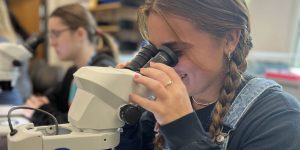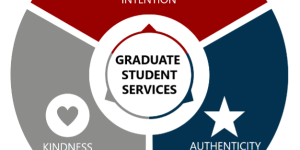Why I teach: The heart of the Hanover experience

By: President Lake Lambert
This fall, I again returned to the classroom and faced a new group of first-year students eagerly beginning their studies. My feelings of excitement and anticipation were remarkably similar to those on my first day of college teaching more than 25 years ago. Since my arrival at Hanover, I have been able to teach five classes. Due to my travel schedule, they were only possible with a teaching partner and I am extremely grateful that faculty, staff and even alumni have been willing to work with me.
Good teaching is at the heart of the Hanover experience. That is why I want to be in the classroom. Not only do I have the opportunity to know our students individually and in depth, but I am also reminded what we really do here. My “regular job” consists of long-range plans, problem-solving, spreadsheets, fundraising and other managerial tasks, but those duties always have a deeper meaning after spending an hour in the classroom. Even better, by mostly teaching first-year students, I come to know a few members of the entering class very well and have the joy of watching their progress through four years and eventually handing them a diploma on graduation day.

At Hanover, the classroom fosters learning, but it is also a place for self-discovery and an opportunity to build relationships with members of the faculty and fellow students. It is a place of challenge but also a place for nurture. When I meet alumni, they often tell me about the impact a Hanover professor made in their lives. Some describe the depth and rigor of learning that made them stand out amongst peers at work or in graduate school. Others describe words of encouragement and support– words that allowed them to see career possibilities never imagined and words that gave them confidence for continued study at Hanover as well as offered affirmation in all aspects of life.
When speaking to new professors about good teaching, I like to describe it as a three-legged stool. The first leg is knowledge about your subject which never stops at the end of graduate school but requires a lifetime of continuous engagement in study and research. The second leg is knowledge about your students. This also changes as new generations emerge from high school with experiences and strengths (as well as deficits) vastly different from the years before. Caring about your students and seeking this knowledge go hand-in-hand. The final leg is knowledge about yourself as a teacher, making it the hardest of them all and requiring a commitment to career-long, critical self-reflection. In my view, anyone who is fully and completely satisfied with their teaching is never a good teacher because a good teacher always wants to be better.
These last years of COVID-19 have been an especially challenging time for good teaching. Opportunities for disciplinary study, research and professional development have been limited. Our students have been filled with anxiety, sometimes separated from us because of ill health and socially distanced in our classrooms, making the typical class discussion harder than ever. We are already seeing the impact of COVID on the high school preparation of our first-year and sophomore students. Our professors, too, have been anxious and stressed, trying to care for their students even as they worry and care for their own health and safety and that of their families. As one of our professors put it, the time of teaching in COVID was “all of the work and none of the fun.”
One of the blessings of teaching is it is full of new starts. A new academic year or a new term welcomes new groups of students and opportunities to try new things. This year it means classrooms without socially distancing, allowing my first-year seminar with Professor of Communication Bill Bettler to look and feel like an actual seminar. It also means an updated syllabus that does a few things different in hopes of better results.
When student papers and projects sit piled on my desk, I sometimes ask myself why I keep doing it, but then I enter the classroom again and all doubts disappear. And when I am waist deep in other college business – tasks essential to the institution and our future but far distant from student learning – I easily remind myself what we really do at Hanover College. Transformative learning requires good teaching and some things never change.



